‘Trauma Time’ – Life While Triggered
Helping Scam Victims to Understand the Trauma Response Experience
Principal Category: Psychological Trauma
Authors:
• Vianey Gonzalez B.Sc(Psych) – Licensed Psychologist, Specialty in Crime Victim Trauma Therapy, Neuropsychologist, Certified Deception Professional, Psychology Advisory Panel & Director of the Society of Citizens Against Relationship Scams Inc.
• Tim McGuinness, Ph.D. – Anthropologist, Scientist, Polymath, Director of the Society of Citizens Against Relationship Scams Inc.
Abstract
When a scam victim’s trauma response is triggered, they can experience a range of emotional, cognitive, behavioral, physical, psychosomatic, and relational reactions that reflect both psychological and physiological distress. These responses often trap victims in a state referred to as “Trauma Time,” where they feel as though they are reliving the scam event.
During such episodes, the breakdown of communication pathways between the upper and lower brain exacerbates feelings of fear, anxiety, and helplessness, while disrupting cognitive functions and distorting perceptions of reality. Effective strategies for managing these trauma responses include recognizing triggers, validating emotions, employing grounding techniques, and seeking professional help. Understanding these processes is crucial for providing effective support and interventions, thereby aiding scam victims in their recovery and enhancing resilience against future threats.

When Scam Victims are Triggered by their Trauma – Time and Life Seem to Lose Reality with Triggers – Understanding It Can Make Recovery Easier!
When a scam victim’s trauma response is triggered, the psychological and neurological processes that occur are complex and deeply rooted in the brain’s response to perceived threats.
Triggers – The Basics
When a trauma response is triggered in scam victims, they can experience a range of reactions that reflect both psychological and physiological distress.
Here are the types of reactions commonly observed:
Emotional Reactions
Intense Fear or Anxiety: Scam victims may experience overwhelming fear or anxiety, particularly when reminded of the scam or when encountering triggers associated with the traumatic event.
Panic Attacks: Sudden and intense episodes of fear or discomfort, accompanied by physical symptoms such as rapid heartbeat, sweating, trembling, and shortness of breath.
Anger or Irritability: Feelings of anger or irritability may arise as victims grapple with the betrayal and violation of trust that often accompanies being scammed.
Sadness or Depression: A sense of profound sadness or depression may set in as victims confront the financial, emotional, and psychological consequences of the scam.
Cognitive Reactions
Intrusive Thoughts: Persistent and distressing thoughts related to the scam may intrude into the victim’s mind, making it difficult to concentrate on daily tasks.
Memory Disturbances: Victims may experience difficulties in remembering details about the scam or may have gaps in their memory related to the traumatic event.
Confusion or Disorientation: There may be a sense of confusion or disorientation about what happened and why, as victims struggle to make sense of their experience.
Behavioral Reactions
Avoidance Behaviors: Scam victims may actively avoid reminders of the scam or situations that could trigger memories of the traumatic event.
Hyper-vigilance: Heightened alertness and vigilance to potential threats, including fear of being scammed again or of encountering similar deceptive situations.
Social Withdrawal: Withdrawal from social interactions and relationships as victims may struggle with feelings of shame, embarrassment, or mistrust.
Increased Substance Use: Some individuals may turn to alcohol, drugs, or other substances as a way to cope with the distressing emotions associated with the scam.
Physical Reactions
Sleep Disturbances: Difficulty falling asleep, staying asleep, or experiencing nightmares related to the scam and its aftermath.
Physical Symptoms: Physical manifestations of stress such as headaches, gastrointestinal disturbances, muscle tension, and fatigue.
Psychosomatic Reactions
Somatization: Psychological distress may manifest as physical symptoms without an underlying medical cause, such as unexplained pain or neurological symptoms.
Relational Reactions
Trust Issues: Scam victims may struggle with trust issues, including difficulty trusting others and feeling betrayed by those they trusted before the scam.
Isolation: Withdrawal from family, friends, or social support networks due to feelings of shame, embarrassment, or fear of judgment.
These reactions can vary in intensity and duration depending on the individual, the severity and type of the trauma, the nature of the scam, and the support available to the victim at the time. Understanding these responses is critical for providing effective support and interventions to help scam victims navigate their recovery process.
‘Traum Time’ During a Trigger Response
Experiencing “Trauma Time” can be profoundly disorienting and distressing for scam victims when triggered by reminders of their traumatic experiences manifest into their reality. During these moments, victims may feel as though they are reliving the scam event, trapped in a state where past trauma overwhelms their ability to stay grounded in the present. Emotionally, it often entails a resurgence of intense fear, anxiety, or panic that mirrors the initial shock and betrayal felt during the scam. This emotional turmoil can be so consuming that it eclipses their current surroundings and circumstances, leaving them feeling helpless and vulnerable.
Cognitively, victims struggle with intrusive thoughts that replay details of the scam, questioning how they fell victim, and fearing the potential consequences. Memory disturbances further complicate their sense of reality, with some aspects of the trauma feeling vivid and others blurred or fragmented. This cognitive fog can make it challenging to concentrate on tasks or engage in meaningful conversations, as their mind remains overloaded with the trauma.
Physically, the experience of Trauma Time can manifest in various ways, including heightened physiological arousal such as rapid heartbeat, sweating, and trembling.
Here’s a detailed explanation of what happens:
Psychological Processes
Re-experiencing Trauma (Flashbacks)
Emotional Flooding: When a trauma trigger is activated, the individual may relive the traumatic event as if it were happening in the present. This re-experiencing is often accompanied by intense emotions such as fear, helplessness, and panic.
Intrusive Memories: Unwanted memories of the trauma can intrude into the person’s thoughts, making it difficult to focus on the present. These memories can be vivid and distressing, leading to a sense of being trapped in “trauma time.”
Hyperarousal
Heightened Alertness: The individual’s nervous system goes into a state of hyperarousal, characterized by heightened alertness and a constant sense of danger. This makes it difficult for them to relax or feel safe.
Anxiety and Panic: The person may experience severe anxiety and panic attacks as their body prepares to fight, flee, or freeze in response to the perceived threat.
Dissociation
Detachment from Reality: Dissociation is a common psychological response to trauma, where the individual feels disconnected from their body or surroundings. This can range from feeling numb or detached to experiencing a complete break from reality.
Memory Gaps: The person may have difficulty recalling details of the traumatic event or even current events, as their mind attempts to protect them from the overwhelming emotions associated with the trauma.
Neurological Processes
Amygdala Activation
Threat Detection: The amygdala, a part of the brain involved in emotional processing, is highly sensitive to threats. When triggered, it activates the body’s fight-or-flight response.
Overactivity: In individuals with a history of trauma, the amygdala can become overactive, leading to exaggerated responses to perceived threats. This heightened state of alertness keeps the person on constant high alert.
Prefrontal Cortex Suppression
Reduced Executive Function: The prefrontal cortex, responsible for higher-order functions like reasoning, decision-making, and impulse control, becomes less active during a trauma response. This suppression impairs the individual’s ability to think logically and make rational decisions.
Loss of Focus: The decreased activity in the prefrontal cortex makes it difficult for the person to stay focused on the present moment, contributing to the sense of being trapped in “trauma time.”
Hippocampus Impairment
Memory Processing: The hippocampus, which plays a key role in forming and retrieving memories, can be affected by trauma. Chronic stress and trauma can lead to a reduction in hippocampal volume, impairing the individual’s ability to differentiate between past and present.
Contextualization: An impaired hippocampus makes it challenging to contextualize the traumatic event, causing the person to react to triggers as if the trauma is happening again.
HPA Axis Activation
Stress Hormone Release: The hypothalamic-pituitary-adrenal (HPA) axis is activated during a trauma response, leading to the release of stress hormones like cortisol and adrenaline. These hormones prepare the body to respond to the threat but also contribute to feelings of anxiety and panic.
Chronic Stress: Prolonged activation of the HPA axis can lead to chronic stress, which has numerous negative effects on the brain and body, including impaired immune function and increased risk of mental health disorders.
Breakdown of Communication Pathways
Upper Brain (Cortex) and Lower Brain (Limbic System) Disconnect
Cortical Suppression: The prefrontal cortex (upper brain) is responsible for rational thought and decision-making. During a trauma response, its activity is suppressed, reducing the individual’s capacity for logical thinking and self-regulation.
Limbic System Domination: The limbic system (lower brain), which includes the amygdala and hippocampus, takes over during a trauma response. This part of the brain is more primitive and focuses on survival, leading to emotional and instinctual reactions rather than thoughtful responses.
“Trauma Time” Phenomenon
Temporal Disorientation: The breakdown in communication between the upper and lower brain can cause temporal disorientation, where the individual feels as though they are reliving the trauma in the present. This disconnection from the current time and place traps them in “trauma time.”
Sensory Overload: The person may experience sensory overload as their brain struggles to process and integrate information from their environment. This can exacerbate feelings of confusion and distress.
Self-Location Uncertainty & Traumatic Triggers
Self-location uncertainty typically refers to a cognitive state where individuals feel disoriented or unsure about their position in time, space, or social relationships. While it is not commonly associated with trauma triggers in the same way as emotional and cognitive responses, trauma can indeed disrupt a person’s sense of self-location temporarily. Here’s how:
Temporal Disorientation: Trauma triggers can lead to a sense of time distortion where the individual may feel as though they are reliving past traumatic events. This can blur their perception of the present moment and make it challenging to distinguish between past and current experiences.
Spatial Disorientation: Trauma can also affect one’s perception of their immediate environment. In heightened states of anxiety or fear triggered by trauma reminders, individuals may feel physically disoriented or find it difficult to feel safe in familiar surroundings.
Cognitive Disruption: Trauma triggers can overwhelm cognitive processes, making it hard to maintain a coherent sense of identity or continuity in their thoughts. This disruption can contribute to a feeling of being detached from reality or unsure about their place in the world.
With self-location uncertainty, its application in understanding trauma responses involves recognizing how trauma can disrupt normal cognitive functioning, including one’s sense of time, space, and identity. This disruption underscores the complexity of trauma’s impact on perception and cognition, highlighting the need for tailored therapeutic approaches to help individuals regain stability and coherence in their experience of the world.
Surviving Traumatic Triggers
For individuals experiencing a traumatic trigger, it is essential to have strategies to recognize the trigger, validate their feelings, regain control, and calm themselves. Here are some suggestions:
Recognize the Trigger
Identify Physical Symptoms: Pay attention to physical signs of stress, such as a rapid heartbeat, sweating, or shallow breathing. These can be indicators that a trigger has been activated.
Notice Emotional Changes: Be aware of sudden shifts in emotions, like intense fear, anger, or sadness, which can signal a trauma response.
Mindfulness Practice: Regular mindfulness can help individuals become more attuned to their body and mind, making it easier to notice when a trigger occurs.
Validate Feelings
Acknowledge the Emotion: Remind yourself that it’s okay to feel the way you do. Trauma responses are normal reactions to abnormal events.
Self-Compassion: Speak to yourself with kindness. Recognize that you are doing your best to cope with a difficult situation.
Journal: Writing down your thoughts and feelings can help in acknowledging and validating your emotions.
Regain Control
Grounding Techniques: Use grounding exercises to anchor yourself in the present moment. For example, focus on the feel of your feet on the ground, describe your surroundings in detail, or hold onto a familiar object.
Deep Breathing: Practice deep, slow breathing to help calm your nervous system. Inhale for a count of four, hold for four, and exhale for four.
Positive Affirmations: Use positive affirmations to counteract negative thoughts. Repeat statements like, “I am safe now,” or “I can handle this” or “Axios – I am worthy” or “I am not alone” or “I am a survivor.”
Calm Yourself After the Event
Engage in Relaxation Activities: Find activities that help you relax, such as taking a warm bath, listening to calming music, or practicing yoga.
Connect with Others: Talk to a trusted friend or family member about your experience. Social support can be incredibly grounding and reassuring.
Professional Help: Consider reaching out to a therapist who specializes in trauma. Professional guidance can provide more personalized coping strategies.
Additional Tips
Create a Safety Plan: Have a set plan for what you will do when you notice a trigger. This can include steps like moving to a safe space, using specific grounding techniques, or calling a supportive person.
Develop a Routine: Consistent daily routines can provide a sense of stability and predictability, helping to reduce the impact of unexpected triggers.
Physical Activity: Exercise can be a powerful way to release built-up tension and stress. Activities like walking, running, or dancing can be very helpful.
By incorporating these strategies, individuals can better manage their trauma responses, validate their experiences, regain a sense of control, and find calm after being triggered.
Grounding Techniques and Interventions
To help individuals manage these responses, grounding techniques and therapeutic interventions can be effective. These may include:
Mindfulness and Grounding Exercises
Present Moment Awareness: Techniques such as deep breathing, sensory focus (e.g., identifying objects in the room), and mindfulness meditation can help individuals reconnect with the present moment and reduce the intensity of their trauma response.
Cognitive-Behavioral Therapy (CBT)
Cognitive Restructuring: CBT can help individuals challenge and reframe distorted thoughts related to the trauma, improving their ability to stay grounded in reality.
Exposure Therapy: Gradual exposure to trauma-related stimuli in a controlled environment can help desensitize the individual’s response and reduce the power of triggers.
Eye Movement Desensitization and Reprocessing (EMDR)
Processing Traumatic Memories: EMDR is a specialized therapy that helps individuals process and integrate traumatic memories, reducing their impact on current functioning.
Medication
Pharmacological Support: In some cases, medication may be prescribed to help manage symptoms of anxiety, depression, or PTSD, providing additional support for the individual’s recovery.
Summary
Understanding the psychological and neurological processes underlying trauma responses is very important for developing effective interventions and helping individuals regain control over their lives.
Surviving Trauma Time requires compassionate support and specialized interventions to help victims regain a sense of safety, stability, and control. By understanding the intense psychological and neurological impact of trauma on scam victims, we can better tailor support mechanisms and therapeutic approaches to maintain healing and resilience in their recovery journey.
IMPORTANT NOTE: This article is intended to be an introductory overview of complex psychological, neurological, physiological, or other concepts, written primarily to help victims of crime understand the wide-ranging actual or potential effects of psychological trauma they may be experiencing. The goal is to provide clarity and validation for the confusing and often overwhelming symptoms that can follow a traumatic event. It is critical to understand that this content is for informational purposes only and does not constitute or is not a substitute for professional medical advice, diagnosis, or treatment. If you are experiencing distress or believe you are suffering from trauma or its effects, it is essential to consult with a qualified mental health professional for personalized care and support.

Welcome to the SCARS INSTITUTE Journal of Scam Psychology
A Journal of Applied Scam, Fraud, and Cybercrime Psychology – and Allied Sciences
A dedicated site for psychology, victimology, criminology, applied sociology and anthropology, and allied sciences, published by the SCARS INSTITUTE™ – Society of Citizens Against Relationship Scams Inc.
TABLE OF CONTENTS
A Question of Trust
At the SCARS Institute, we invite you to do your own research on the topics we speak about and publish, Our team investigates the subject being discussed, especially when it comes to understanding the scam victims-survivors experience. You can do Google searches but in many cases, you will have to wade through scientific papers and studies. However, remember that biases and perspectives matter and influence the outcome. Regardless, we encourage you to explore these topics as thoroughly as you can for your own awareness.
Please Leave A Comment
Recent Comments
On Other Articles
[better_recent_comments number=”5″ format=”{avatar} on {post}: “{comment}” {date}” avatar_size=”20″]
A Note About Labeling!
We often use the term ‘scam victim’ in our articles, but this is a convenience to help those searching for information in search engines like Google. It is just a convenience and has no deeper meaning. If you have come through such an experience, YOU are a Survivor! It was not your fault. You are not alone! Axios!
Statement About Victim Blaming
Some of our articles discuss various aspects of victims. This is both about better understanding victims (the science of victimology) and their behaviors and psychology. This helps us to educate victims/survivors about why these crimes happened and to not blame themselves, better develop recovery programs, and to help victims avoid scams in the future. At times this may sound like blaming the victim, but it does not blame scam victims, we are simply explaining the hows and whys of the experience victims have.
These articles, about the Psychology of Scams or Victim Psychology – meaning that all humans have psychological or cognitive characteristics in common that can either be exploited or work against us – help us all to understand the unique challenges victims face before, during, and after scams, fraud, or cybercrimes. These sometimes talk about some of the vulnerabilities the scammers exploit. Victims rarely have control of them or are even aware of them, until something like a scam happens and then they can learn how their mind works and how to overcome these mechanisms.
Articles like these help victims and others understand these processes and how to help prevent them from being exploited again or to help them recover more easily by understanding their post-scam behaviors. Learn more about the Psychology of Scams at www.ScamPsychology.org
Psychology Disclaimer:
All articles about psychology, neurology, and the human brain on this website are for information & education only
The information provided in these articles is intended for educational and self-help purposes only and should not be construed as a substitute for professional therapy or counseling.
While any self-help techniques outlined herein may be beneficial for scam victims seeking to recover from their experience and move towards recovery, it is important to consult with a qualified mental health professional before initiating any course of action. Each individual’s experience and needs are unique, and what works for one person may not be suitable for another.
Additionally, any approach may not be appropriate for individuals with certain pre-existing mental health conditions or trauma histories. It is advisable to seek guidance from a licensed therapist or counselor who can provide personalized support, guidance, and treatment tailored to your specific needs.
If you are experiencing significant distress or emotional difficulties related to a scam or other traumatic event, please consult your doctor or mental health provider for appropriate care and support.
Also, please read our SCARS Institute Statement About Professional Care for Scam Victims – here
If you are in crisis, feeling desperate, or in despair please call 988 or your local crisis hotline.
SCARS Institute Resources:
- If you are a victim of scams go to www.ScamVictimsSupport.org for real knowledge and help
- Enroll in SCARS Scam Survivor’s School now at www.SCARSeducation.org
- To report criminals visit https://reporting.AgainstScams.org – we will NEVER give your data to money recovery companies like some do!
- Sign up for our free support & recovery help by https://support.AgainstScams.org
- Follow us and Find our podcasts, webinars, and helpful videos on YouTube: https://www.youtube.com/@RomancescamsNowcom
- SCARS Institute Songs for Victim-Survivors: https://www.youtube.com/playlist…
- See SCARS Institute Scam Victim Self-Help Books at https://shop.AgainstScams.org
- Learn about the Psychology of Scams at www.ScamPsychology.org
- Dig deeper into the reality of scams, fraud, and cybercrime at www.ScamsNOW.com and www.RomanceScamsNOW.com
- Scam Survivor’s Stories: www.ScamSurvivorStories.org
- For Scam Victim Advocates visit www.ScamVictimsAdvocates.org
- See more scammer photos on www.ScammerPhotos.com




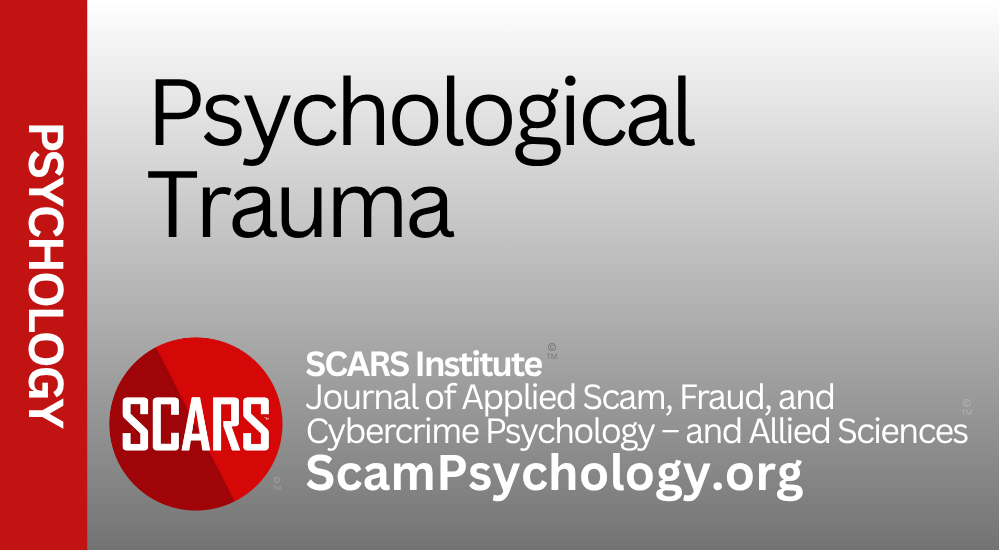
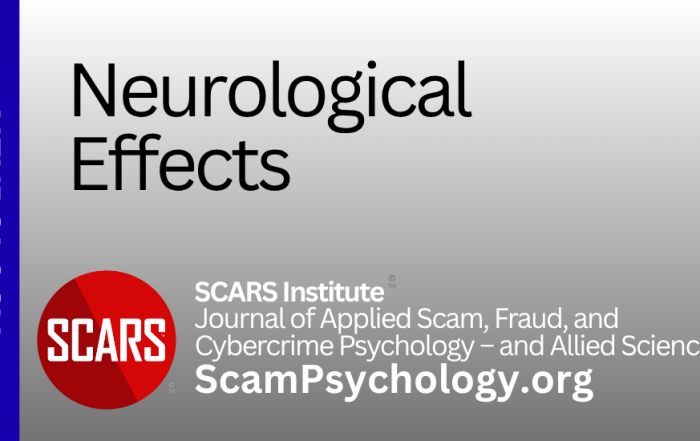

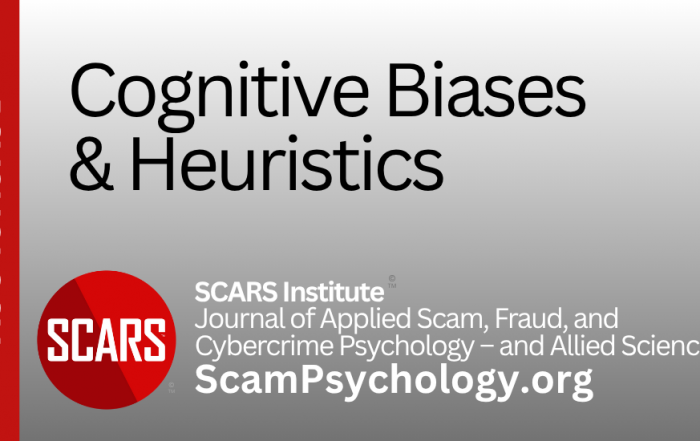
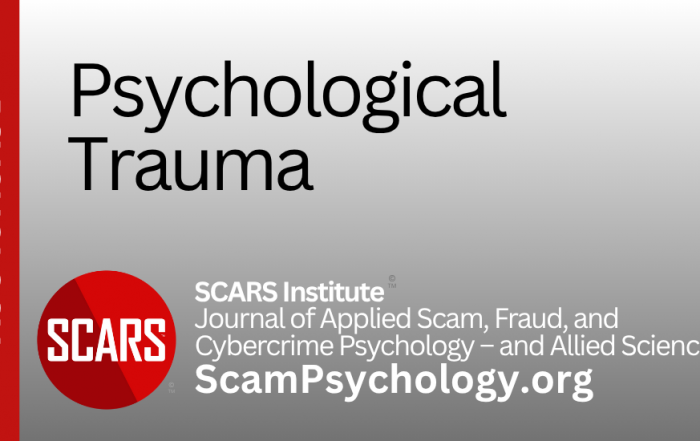



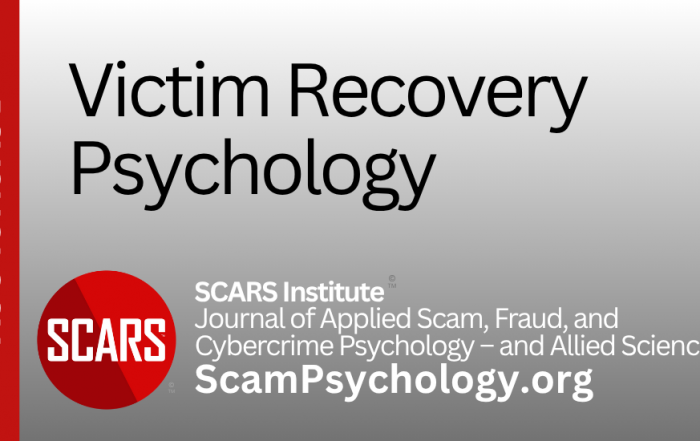


![niprc1.png1_-150×1501-11[1]](https://scampsychology.org/wp-content/uploads/2025/05/niprc1.png1_-150x1501-111.webp)
Unfortunately I experience trauma time most frequently when reading articles like this. But I try to remind myself that it’s all part of the healing process.
As a recent victim the challenge is to begin educating yourself almost before your mind is ready. This is because the very act of the learning help to rebuild your rational beliefs that were so damaged by the crime and criminals.